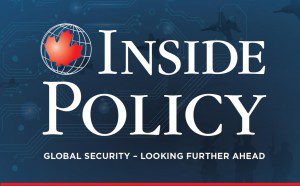 Recent reports that North Korea rocket engines come from Ukraine should be discounted, writes Marcus Kolga. The claim is likely part of a Russian effort to distract the West and support its narrative that Ukraine is a failed pro-democracy project.
Recent reports that North Korea rocket engines come from Ukraine should be discounted, writes Marcus Kolga. The claim is likely part of a Russian effort to distract the West and support its narrative that Ukraine is a failed pro-democracy project.
By Marcus Kolga, Aug. 18, 2017
As global tension continues to escalate from Eastern Europe to the Korean Peninsula, a new report this week claims that North Korea’s new nuclear missiles are in fact powered by rocket engines developed for Soviet (and now Russian) nuclear weapons.
A New York Times report identifies the RD-250 engine used on North Korea’s Hwasong-14 intercontinental ballistic missile (ICBM) as being the same as those used in the SS-18 nuclear missiles, which would explain how North Korean missile technology has advanced rapidly after repeated failed launches.
The report points to a Ukrainian rocket manufacturer, Yuzhmash, as the possible source of the engine. However, according to a statement, the company hasn’t manufactured those engines or the SS-18 missiles at its plant since 1991. If technical plans were sold to Pyongyang, they may have come from the engine’s Russian developer, NPO Energomash, according to analysis by The Bulletin of the Atomic Scientists.
Belief that Ukraine is to blame for North Korea’s great technological leap forward would clearly benefit one of the few remaining supporters of Pyongyang – Vladimir Putin.
In contrast to most of the world’s governments, the Kremlin has disputed US claims about recent North Korean missile launches and opposed UN proposals for tighter economic sanctions. North Korean leader, Kim Jong-un, has also provided the Kremlin with an army of slave labourers for the construction of the World Cup stadium in Putin’s hometown of St. Petersburg.
Belief that Ukraine is to blame for North Korea’s great technological leap forward would clearly benefit one of the few remaining supporters of Pyongyang – Vladimir Putin.
Notwithstanding the immense challenges facing Ukraine on corruption, it is unlikely that any Ukrainian official or business would risk mass international sanctions, and perhaps criminal proceedings, to assist the North Korean regime.
Yuzhmash, the company named by The Times as a manufacturer of the engines, recently entered into a lucrative agreement with Canadian space launch company, Maritime Launch Services, to build several launch vehicles. It’s doubtful that the Ukrainian company or government would have risked this agreement, and its entire future, on a short-sighted and illegal transaction with North Korea.
In contrast, illegal arms dealing by Russian entities has been an international problem since the end of the cold war.
The “SS-18 Satan” ICBM, which the RD-250 engine propels into near orbit, has been a mainstay of the Soviet and Russian nuclear arsenals since the 1960s. In the 1980s Moscow deployed enough SS-18s to destroy up to 80 percent of the US nuclear arsenal. Even after doing so, nearly 500 SS-18s would have remained; so large was the Kremlin’s arsenal of SS-18s. Despite a reduction of missiles and launchers in the START treaty, hundreds still remain operational or in Russian stockpiles.
The likelihood that any hard engine technology was delivered from Ukraine is extremely unlikely. SS-18 missiles were never deployed there and Ukraine destroyed any remaining nuclear missiles in the early 1990’s. Ukraine also agreed to remain a non-nuclear country as part of the 1994 Budapest Memorandum in exchange for Russian, UK and US guarantees about the sovereignty of Ukraine, including Crimea.
Illegal arms dealing by Russian entities has been an international problem since the end of the cold war.
Corruption within Russia’s own armed forces is well known. The smuggling of nuclear weapons technology or materials to terror groups and rogue states has been a major concern for over the last two decades. In recent times, even heavily guarded Russian radioactive materials have simply gone “missing.” A UK government report stated that a rare and deadly substance, polonium 210, was stolen from a Russian state run plant and later used to kill former KGB agent turned whistleblowing Putin critic, Alexander Litvenenko.
Some defence analysts also believe that North Korea may have been capable of manufacturing such an engine independently, possibly with help from Iran.
Western journalists and governments should avoid taking the Kremlin’s bait about Ukrainian involvement with North Korea. The story does little more than support the Kremlin’s domestic narrative about Ukraine as a failed pro-democracy project, which Russians should avoid repeating. It overlooks a more obvious possible external source for this technology, while downplaying the prospect that the North Koreans could have made such a technological leap themselves.
It also makes Western governments second guess their support for Ukrainian sovereignty – including the United States, which is contemplating sending arms to Ukraine to help defend against ongoing Russian sponsored aggression in Donbas. In that sense, this latest headline about North Korean engines is entirely consistent with the Kremlin’s objectives.
Marcus Kolga is a Senior Fellow at the Macdonald-Laurier Institute’s Centre for Advancing Canada’s Interests Abroad.




